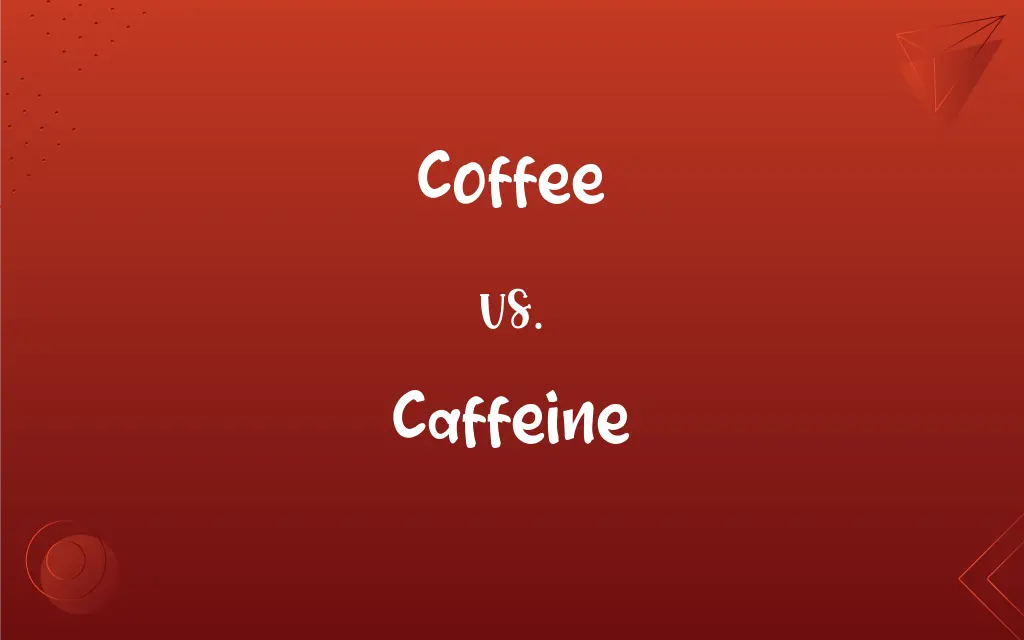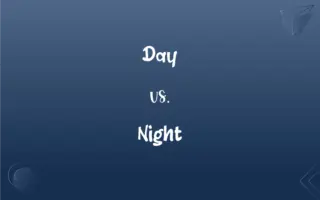Coffee vs. Caffeine: What's the Difference?
Edited by Aimie Carlson || By Janet White || Published on December 8, 2023
Coffee is a brewed drink made from roasted coffee beans. Caffeine is a stimulant chemical found in coffee and other plants.

Key Differences
Coffee is a popular beverage made from roasted and ground coffee beans, often enjoyed for its rich flavor and aroma. Caffeine, on the other hand, is a component of coffee, is a natural stimulant that affects the central nervous system, providing an energy boost.
Coffee is known for its various flavors and preparation methods, caffeine is recognized for its stimulating properties. While, caffeine is not only found in coffee but also in tea, chocolate, and some soft drinks.
The coffee experience is influenced by bean type, roast, and brewing method, which affects its taste and caffeine content. The effects of caffeine, such as increased alertness and reduced fatigue, are consistent regardless of its source.
Coffee can be consumed in various forms, such as espresso, latte, or black coffee, each differing in taste and caffeine concentration. Caffeine, on the other hand, is a singular compound, its effects varying mostly by quantity rather than form.
Coffee provides a sensory experience and cultural significance, whereas caffeine's main role is its psychoactive effects, like enhancing focus and concentration.
ADVERTISEMENT
Comparison Chart
Nature
A beverage made from roasted beans
A chemical compound
Primary Attribute
Rich flavor and aroma
Stimulating effects on the nervous system
Sources
Obtained from coffee beans
Found in coffee, tea, chocolate, and some soft drinks
Consumption Forms
Espresso, latte, black coffee, etc.
Consumed as part of various beverages and foods
Main Role
Provides sensory experience and social enjoyment
Enhances alertness and reduces fatigue
ADVERTISEMENT
Coffee and Caffeine Definitions
Coffee
A beverage made from ground, roasted coffee beans.
She started her day with a fresh cup of coffee.
Caffeine
A compound that stimulates the central nervous system.
The caffeine in his morning coffee helped him feel more alert.
Coffee
A popular global drink often consumed for its stimulating effects.
He grabbed a coffee to stay awake during the meeting.
Caffeine
A natural stimulant found in coffee, tea, and certain plants.
She avoids caffeine in the evening to sleep better.
Coffee
A dark-colored drink with a characteristic aroma and slightly bitter taste.
The aroma of freshly brewed coffee filled the cafe.
Caffeine
The active component in many beverages for its energizing effects.
Athletes sometimes use caffeine for an extra burst of energy.
Coffee
The beans or grounds from which the drink is made.
She bought premium coffee beans for her espresso machine.
Caffeine
A frequent ingredient in medications for pain relief and alertness.
The headache tablet contained caffeine to increase its effectiveness.
Coffee
A social beverage commonly served hot or cold.
They met over coffee to discuss the project.
Caffeine
A bitter compound used to enhance alertness and reduce fatigue.
The caffeine in energy drinks can provide a quick energy boost.
Coffee
Any of various tropical African shrubs or trees of the genus Coffea, especially C. arabica or C. canephora, widely cultivated in the tropics for their seeds that are dried, roasted, and ground to prepare a stimulating aromatic drink.
Caffeine
A bitter white alkaloid, C8H10N4O2, found in certain plants such as cacao, coffee, kola, and tea, that stimulates the central nervous system and body metabolism and is used in medicine, usually in combination with other drugs, to relieve headaches and treat respiratory conditions in premature infants.
Caffeine
An alkaloid, C8H10N4O2, found naturally in tea and coffee plants which acts as a mild stimulant on the central nervous system.
Caffeine
A bitter alkaloid found in coffee and tea that is responsible for their stimulating effects
FAQs
What is coffee?
A brewed drink from roasted coffee beans.
Is decaffeinated coffee completely free of caffeine?
No, it still contains a small amount of caffeine.
What is caffeine?
A natural stimulant found in coffee and other plants.
How much caffeine is in a typical cup of coffee?
It varies, but generally around 95 mg per 8 oz cup.
Can coffee have different caffeine levels?
Yes, depending on the bean type and brewing method.
What are the effects of caffeine?
Increased alertness and reduced fatigue.
Can caffeine be addictive?
Yes, it can be habit-forming.
Can you get caffeine from sources other than coffee?
Yes, from tea, chocolate, and some soft drinks.
What determines the flavor of coffee?
Bean type, roast, and brewing method.
Is it safe to consume caffeine daily?
In moderate amounts, it's generally safe for most people.
What are popular coffee beverages?
Espresso, latte, cappuccino, and black coffee.
Does caffeine have any health benefits?
It can enhance focus and has been linked to other health benefits.
What's the difference between Arabica and Robusta coffee?
They differ in taste, caffeine content, and growing conditions.
Can coffee be part of a healthy diet?
In moderation, it can be a healthy choice.
What is a coffee bean?
The seed from the fruit of the coffee plant.
How does espresso compare to regular coffee in caffeine content?
Espresso has more caffeine per ounce but less in a typical serving.
Can caffeine cause dehydration?
In large amounts, it can have a diuretic effect.
Can caffeine impact sleep?
Yes, it can interfere with sleep patterns.
How long does caffeine's effect last?
Generally, 3 to 5 hours.
Is caffeine harmful in high doses?
High doses can lead to negative side effects.
About Author
Written by
Janet WhiteJanet White has been an esteemed writer and blogger for Difference Wiki. Holding a Master's degree in Science and Medical Journalism from the prestigious Boston University, she has consistently demonstrated her expertise and passion for her field. When she's not immersed in her work, Janet relishes her time exercising, delving into a good book, and cherishing moments with friends and family.
Edited by
Aimie CarlsonAimie Carlson, holding a master's degree in English literature, is a fervent English language enthusiast. She lends her writing talents to Difference Wiki, a prominent website that specializes in comparisons, offering readers insightful analyses that both captivate and inform.







































































